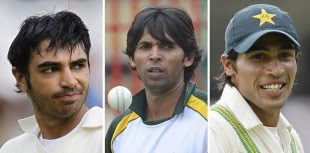Join 24/7 Cricket News For More Updates
Spot-fixing controversy
Richard Sydenham at Southwark Crown Court
November 2, 2011
All three Pakistan players found guilty of spot-fixing and awaiting sentence appeared in the dock together for the first time on Wednesday morning at a special hearing at Southwark Crown Court. The judge will, after lunch, hear from the lawyer of Mohammad Amir to ascertain exactly his involvement in the spot-fixing scandal and to discover whether or not he was actually pressurised into cheating as his initial plea had in fact stated.
Former captain Salman Butt and fast bowler Mohammad Asif, who were found guilty of conspiring to cheat and conspiring to accept corrupt payments by a jury on Tuesday, were joined by their former team-mate and co-conspirator Amir on the 21st day of the trial, where there was more media and public interest than at any other stage. Almost 60 people were stuffed into Court No.4 and special room was made for excess media in a space next to the jury seats.
Amir, who wore a grey suit and black shirt with his hair still at shoulder length, had pleaded guilty at a pre-trial to bowling two pre-determined no-balls at the Lord's Test last year. He had a dock security officer to his left and a female Urdu interpreter to his right. Next to her was Asif, and then Butt to his right.
His barrister Henry Blaxland QC explained to Justice Cooke that Amir, 19, will not be giving evidence and that seemed to perplex the judge, as he has heard from Butt and Asif and clearly was keen to hear of Amir's involvement from the player himself. Blaxland pointed out that he had handed the judge a 19-page file of mitigation. Subsequently, a recess was called at 11.30 am until 2 pm to allow the judge enough time to absorb the file, prior to questioning Blaxland on its contents.
Blaxland also pointed out that Amir was taking responsibility for his own actions at Lord's and was not seeking to point the finger elsewhere. However, Justice Cooke referred him to point 3 of his basis of plea given at the pre-trial. That said: "The defendant only became involved as a result of pressure (not amounting to physical threats) and influence, to the effect that, if he did not become involved, he would suffer serious professional implications for his future career."
Justice Cooke told Blaxland that this statement was as clear as anything and especially after taking all the evidence that he had heard into account that Butt clearly orchestrated the pre-determined no-balls at Lord's and the judge was also keen to ascertain what kind of pressure Amir was apparently placed under by members of his team. This exchange is likely to take up most of the afternoon with sentencing expected to happen on Thursday.
From reading between the lines, Cooke seemed confused at how Amir could say he was pressured into cheating on one hand and, on the other, go to court and say he was not blaming Butt or any other player.
The judge was not impressed by the change of stance and said Butt's role "was a much more significant one" than that of the other players. He also suggested to Blaxland that there was much more evidence connected with Amir that linked him to other corrupt activities such as text messages with a Pakistani unknown number than only the bowling of two no-balls at Lord's. Blaxland promised to explain the other examples of possible fixing when he addresses the court.
Chief prosecutor Aftab Jafferjee QC also explained to the judge there would be applications for compensation, thought to be from News of the World owners News Ltd., to recover as much as possible of their £150,000 - the amount that was paid to Mazhar Majeed, the agent who set up the no-balls.
Jafferjee said £9,389 was sought from Amir, £8,120 from Asif, £30,937 from Butt and £2,700 from Majeed. Those amounts were confiscated from the individuals during police searches just after the sting operation. Jafferjee revealed it left a shortfall of £98,854. More details on this aspect will be known at a later date.
The jury was officially released from the case on Tuesday but were given permission to attend the conclusion of the trial by Justice Cooke. Four female jurors did take up this offer and attended.
Amir is being supported by the renowned human rights lawyer Gareth Peirce, who sat on the back bench in the middle of the courtroom just in front of the Perspex screen that separated her from her client Amir.
Bookmark and Share This Post :










0 comments:
Post a Comment